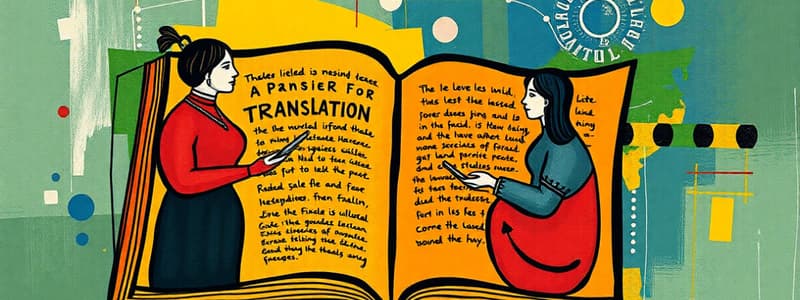Podcast
Questions and Answers
What was a significant factor in the revival of translation activity in Europe during the Renaissance period?
What was a significant factor in the revival of translation activity in Europe during the Renaissance period?
- The invention of the printing press.
- The decline of the Roman Empire. (correct)
- The stabilization and assimilation of translated texts. (correct)
- The introduction of new languages from Africa.
Which civilizations' heritages were primarily translated into Arabic during the early periods of Arab civilization?
Which civilizations' heritages were primarily translated into Arabic during the early periods of Arab civilization?
- Persian and Roman. (correct)
- Mesoamerican and Norse.
- Indian and Chinese.
- Egyptian and Babylonian.
Which event is associated with the transfer of knowledge and treasures that revitalized translation in Europe?
Which event is associated with the transfer of knowledge and treasures that revitalized translation in Europe?
- The signing of the Magna Carta.
- The fall of Constantinople. (correct)
- The fall of the Roman Empire.
- The Crusades.
During which period was there a notable increase in translation activities in Iraq?
During which period was there a notable increase in translation activities in Iraq?
What was one of the reasons for the lack of translation activities in Europe during the Middle Ages?
What was one of the reasons for the lack of translation activities in Europe during the Middle Ages?
What was a significant turning point in the translation efforts during the 19th century?
What was a significant turning point in the translation efforts during the 19th century?
Which of the following elements is NOT explicitly mentioned as a focus of translation?
Which of the following elements is NOT explicitly mentioned as a focus of translation?
How did the translation activities in the Islamic world contribute to the diffusion of knowledge?
How did the translation activities in the Islamic world contribute to the diffusion of knowledge?
What combined skill set was vital for the translation process in the Islamic world?
What combined skill set was vital for the translation process in the Islamic world?
What did the flourishing of knowledge during the 19th century signify about translation?
What did the flourishing of knowledge during the 19th century signify about translation?
Flashcards are hidden until you start studying
Study Notes
History of Translation
- Translation is as old as time and has been crucial for intellectual and scientific advancements throughout history.
- Ancient Roman civilization actively translated Greek works into Latin.
- The fall of Constantinople and the transfer of Greek and Roman treasures to Western nations led to widespread translation into European languages.
- The Renaissance was fueled by translations that stabilized, digested, and assimilated ancient texts.
- Arab civilization also played a major role in translation.
- From the 7th to 8th centuries, Arabic translations of Persian, Roman, and Greek works played a significant role in knowledge diffusion.
- The Abbasid period saw a boom in translation activities in Iraq, specifically in areas like medicine, astrology, mathematics, philosophy, and logic.
- The 19th century marked a turning point, viewing translation as a science.
- The language academy in Egypt established by Rif'at Tahtawi focused on translating European languages, particularly English.
- This transformation emphasized a systematic approach to translation, prioritizing the expertise and knowledge of translators.
Aspects of Translation
- Translation encompasses various aspects, including grammar, words, style, and sounds.
Studying That Suits You
Use AI to generate personalized quizzes and flashcards to suit your learning preferences.




